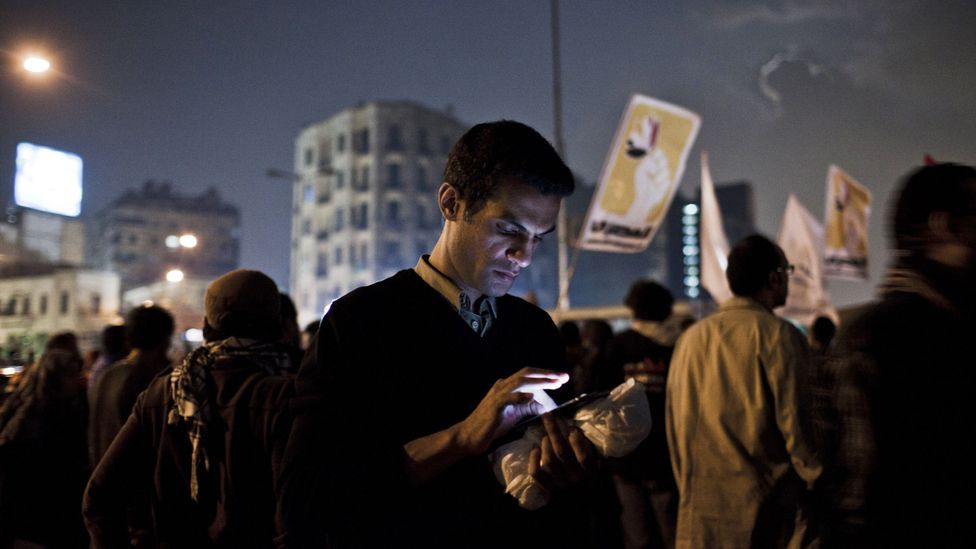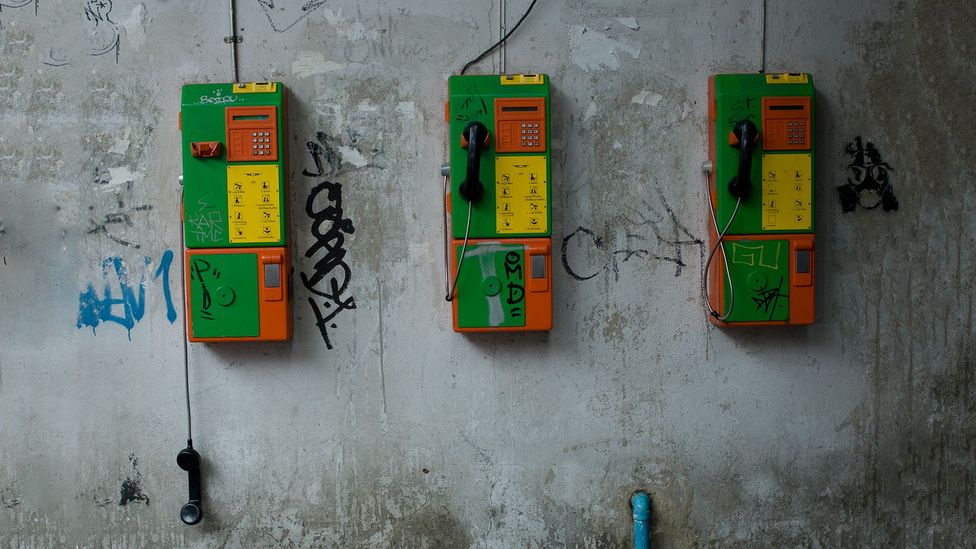Ac Stopped Working for Three Hours Then Started Working Normally Again
What if the net stopped working for a day?
(Paradigm credit:
Getty Images
)

For many people, going without the cyberspace fifty-fifty for a few hours is unthinkable. Simply if information technology did cease working, the bear on might not be what you lot'd expect.
J
Jeff Hancock likes to give his Stanford University students weekend assignments that allow them experience concepts discussed in class for themselves. Before 2008, he would sometimes challenge his students to stay off the internet for 48 hours and then discuss how it affected them. Simply when Hancock returned to work in 2009, after a year-long sabbatical, things had changed.
"When I tried to introduce the job, there was a form revolt," says Hancock, who studies the psychological and social processes involved in online communication. "The students emphatically said the assignment was incommunicable and unfair."
They argued that going offline even for a weekend would forbid them from completing work in other classes, ruin their social lives, and make their friends and family unit worry that something terrible had happened to them. Hancock had to concede and cancelled the activeness – and he's never attempted information technology over again. "That was 2009, and now with mobile equally present as it is, I don't fifty-fifty know what students would practise if I asked them to do that," he says. "They'd probably written report me to the university president."

A 404 error pops up when a webpage cannot be found – but having no internet at all is almost unthinkable (Credit: Getty Images)
Just with our e'er-connected lifestyles, the question is now more relevant than ever: what would happen if the net stopped for a day? It turns out the impact might not be quite what yous'd expect.
In 1995, fewer than ane% of the world's population was online. The internet was a curiosity, used generally by people in the W. Fast-frontward xx years and today more iii.5bn people have an internet connection – almost one-half of all humans on the planet – and the number is growing at a rate of around 10 people a second.
According to the Pew Inquiry Centre, a fifth of all Americans say they use the internet "almost constantly" and 73% say they use it at least daily. Figures in the UK are similar: a 2016 survey found that nearly 90% of adults said they had used the internet in the previous iii months. For many, it is now nearly impossible to imagine life without the net.
"1 of the biggest issues with the internet today is that people take it for granted – all the same they don't understand the caste to which we've allowed it to infiltrate almost every aspect of our lives," says William Dutton at Michigan Land Academy, who is the author of the volume Society and the Internet. "They don't fifty-fifty recall most not having access to it."
Simply the internet is not inviolable. In theory, it could exist taken abroad, on a global or national scale, for a stretch of time. Cyberattacks are 1 possibility. Malicious hackers could bring the internet to a standstill by releasing software that aggressively targeted vulnerabilities in routers – the devices that forward cyberspace traffic. Shutting downwardly domain name servers – the internet'south accost books – would also cause massive disruption, preventing websites from loading, for case.
Cut the abyssal cables that carry vast volumes of internet traffic between continents would likewise cause significant disruptions by disconnecting i function of the world from another. These cables may not be easy targets for attackers, but they are sometimes damaged accidentally. In 2008, people in the Middle East, India and Southeast Asia were plagued past major internet outages on three separate occasions when submarine cables were cut or interfered with.
Some governments also take "impale switches" that tin can effectively turn off the internet in their country. Egypt did this during the Arab Spring uprising in 2011 to brand information technology more hard for protesters to coordinate their activity. Turkey and Iran have also shut off internet connectivity during protests. China is rumoured to take a impale switch of its own. And American senators have proposed creating one in the The states as a means to defend the country from cyberattack.
Edifice a kill switch is not like shooting fish in a barrel, however. The larger and more developed the land, the harder information technology is to shut down the cyberspace completely – there are simply too many connections betwixt networks both inside and outside national borders.

Egypt turned off its cyberspace during the Arab Spring uprising in 2011 to make it more difficult for protesters to coordinate their activeness (Credit: Getty Images)
The most devastating strikes could come up from infinite, however. A large solar storm that sent flares in our management would take out satellites, power grids and computer systems. "What bombs and terrorism tin can't practise might exist accomplished in moments past a solar flare," says David Eagleman, a neuroscientist at Stanford Academy and author of Why the Net Matters. "The adjacent major geomagnetic storms are somewhen coming."
But most outages would non concluding long. "There'due south an army of people set to put things right," says Scott Borg at the United States Cyber Consequences Unit, a non-turn a profit organisation. "The net service providers and the companies that brand the routing equipment have plans and personnel in place for getting things up and running again if unexpected vulnerabilities are exploited." We are so used to having an always-on net connection that fifty-fifty relatively brusk disruptions would have an effect, nevertheless. It only might not be what you would expect.
For a start, the touch on to the economy may not exist too severe. In 2008, the Usa Section of Homeland Security asked Borg to look into what might happen if the net went down. Borg and his colleagues analysed the economic furnishings of computer and internet outages in the Us from 2000 onwards. Looking at quarterly financial reports from the 20 companies that claimed to be most affected in each case, also as more than general economic statistics, they discovered that the fiscal touch on of an outage was surprisingly insignificant – at least for outages that lasted no more than iv days, which is all they studied.
"These were instances where enormous losses were being claimed– in the hundreds of millions and even billions of dollars," Borg says. "Simply while some industries like hotels, airlines and brokerage firms suffered a bit, even they didn't experience very large losses."
It turned out that losing internet access for a few days just fabricated people autumn backside on their work. "People carried out yet activities they would have done had the internet been upward, just they just did it 2 or 3 days later," Borg says. "The economy is set up to deal with what essentially amounts to a vacation weekend."
In some cases, shutting downward the internet for a short time might fifty-fifty increase productivity. In another study, Borg and his colleagues analysed what happened when a visitor suffered an cyberspace outage that lasted four hours or more. Rather than twiddle their thumbs, employees did things that they would usually put off, such as dealing with paperwork. The result was a boost for business organisation. "We jokingly suggested that if every visitor turned off their computers for a few hours each month and fabricated people practice the tasks they postponed, in that location'd be an overall productivity benefit," Borg says. "I see no reason why that wouldn't also apply to basically the whole economy."
Travel probably would not be affected as well much in the brusk term, either – then long as the blackout lasted no more than a day or so. Planes can wing without the net, and trains and buses would continue to run. Longer outages would start to accept an effect on logistics, however. Without the internet it would be hard for businesses to operate. "I've suggested that people and businesses should take a programme in identify in the event of internet loss, but I haven't heard of anyone doing that yet," Eagleman says.

When the telephone network stops working it tin make people feel isolated or uneasy (Credit: Getty Images)
A large communication breakdown would probably disproportionately affect small businesses and blue-neckband workers. In 1998, as many as 90% of the fifty million pagers in the US stopped working because of a satellite failure. In the days following the blackout, Dutton surveyed 250 pager users in Los Angeles and found clear socioeconomic divisions in people'southward reactions to being cut off. Upper-center-class individuals with managerial or professional person jobs did not perceive the event as largely problematic. "To them, information technology felt like a snowfall day," Dutton says. "It was a relief."
Simply many blue-collar freelancers such equally plumbers and carpenters relied solely on their pagers for getting jobs and found themselves out of work for a few days. Unmarried mothers who left their children at daycare also reported meaning distress at not being able to be paged if a problem occurred. "So you have to realise that your reaction to the idea of losing the cyberspace is likely to be based on your socioeconomic status," Dutton says.
Psychological effects, like feelings of isolation and anxiety, would hitting people across the board, nevertheless. "Most of the cyberspace is designed for one purpose: to allow us to communicate with each other," Hancock says. We are used to beingness able to connect to anyone, anywhere and at any time. "An inability to do that would be unsettling." It'south a feeling Borg recognises besides. "I know when I realise I've left my smartphone backside, I feel slightly naked," he says. "I of a sudden take to remember, 'Do I actually know where I'm going? What if my car breaks downward, could I talk anyone into letting me use their phone to call for help?'"
History supports this. In 1975, a fire at the New York Telephone Company cut off the telephone service in a 300-block area of Manhattan for 23 days. In a survey of 190 people carried out immediately afterwards lines were restored, researchers constitute that four-fifths of respondents said they missed the phone, specially its ability to connect them with friends and family. Over two-thirds said the lack of service made them experience "isolated" or "uneasy," and nearly iii-quarters said they felt more than in control when their service was restored.
"There's this thought that perchance people would become more than social and more than in touch with friends and family if they didn't have utilise of the cyberspace, but I retrieve that'southward really mistaken," Dutton says. "Most people using the internet are really more social than those who are not using the net."
Stine Lomborg at the University of Copenhagen agrees. "It's not similar we'd be more likely to speak to strangers at the bus finish if we didn't accept our smartphones – non at all," she says. The loss of connection may brand people more social in specific situations, such as forcing co-workers to speak to each other rather than sending emails, simply overall the experience is probable to be sad. "The world wouldn't fall apart if we didn't have access to the internet for a day," she says. "But for most people I retrieve even 1 day without it would be terrifying."
The feeling would be fleeting, however. Losing the internet may make people recognise its importance in their lives, only we would soon be taking it for granted again, says Hancock. "I'd like to say an internet coma would cause a shift in our thinking, merely I don't recall it would." Still, that's all the same not enough to persuade his students to requite information technology upwards for a weekend.
Proceed upwards to date with Future At present stories by joining our 800,000+ fans on Facebook , or follow us on Twitter , Google+ , LinkedIn and Instagram .
If you lot liked this story, sign up for the weekly bbc.com features newsletter , called "If You Only Read 6 Things This Week". A handpicked selection of stories from BBC Hereafter, Earth, Civilization, Capital, Travel and Autos, delivered to your inbox every Fri.
Source: https://www.bbc.com/future/article/20170207-what-if-the-internet-stopped-for-a-day
0 Response to "Ac Stopped Working for Three Hours Then Started Working Normally Again"
Post a Comment